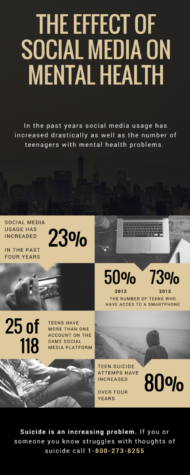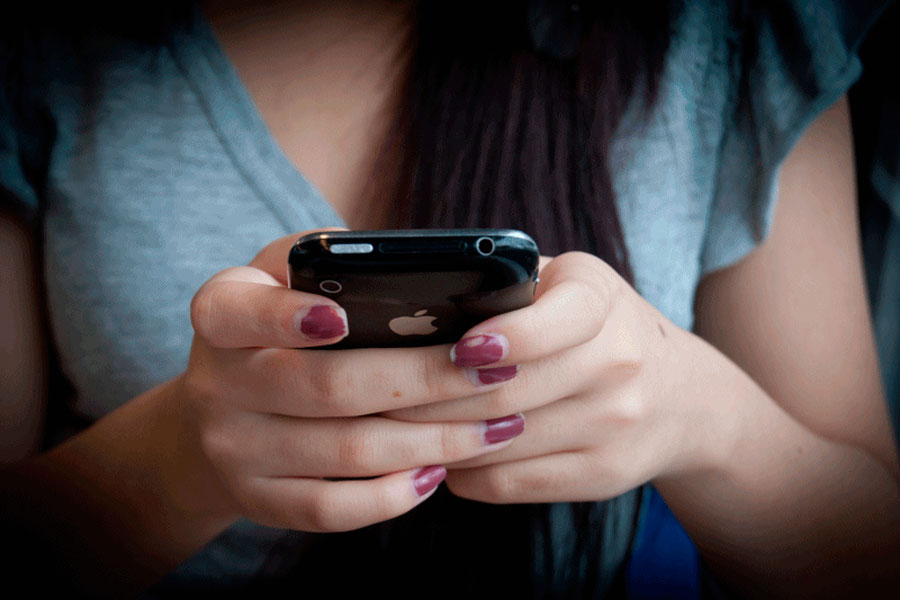Sophomore Alex Sims unglues his eyes from his phone to listens to the teacher’s instructions. The classroom returns to silence and his eyes fall back to the small screen in his lap. Sims scrolls through Twitter as an empty feeling fills him– reminding him of the perfect life he doesn’t have.
Social media usage has increased in the past years as well as the number of teens who suffer from depression. In 2012, 50 percent of teenagers owned smartphones, then four years later it jumped to 73 percent. Alongside that, the number of attempted suicides increased 23 percent. We as a society have traded artificial relationships for real ones. The lack of true connection leads to mental health issues. — Bedwell
“[Social media] is not good for us,” Sims said. “We love it to death because we can’t get enough of each other. You never get a break from anyone unless you’re disconnected.”
According to counselor James Bedwell, research proves the more time someone spends on social media the more likely they are to develop mental health issues. Bedwell suggests reaching out and seeking help from a professional for those who fear they are addicted to social media. About 50 percent of the students who see Bedwell deal with depression, most of the time related to social media.
“[Social media] is a convenient way to maintain relationships. We are social creatures by nature,” Bedwell said. “The problem is that most of the relationships are artificial. We as a society have traded artificial relationships for real ones. The lack of true connection leads to mental health issues.”
Sims uses social media as an outlet to vent when needed. In a study of 118 children ages one to 18, 25 of them have more than one account on the same social media platform– using this other account as a place to vent, and they only allow their close friends to follow them.
 “It’s kinda relieving because you feel a sense of relief because you got something out,” Sims said. “The thing about subtweet accounts specifically is if you post something people will ask about it later, so you’re pretty much starting a conversation and saving it for later.”
“It’s kinda relieving because you feel a sense of relief because you got something out,” Sims said. “The thing about subtweet accounts specifically is if you post something people will ask about it later, so you’re pretty much starting a conversation and saving it for later.”
Celebrities and other social figures use social media as a platform to announce upcoming events and post about their social life in order to gain publicity. With celebrities constantly posting on social media, teens have become used to having constant access to the who, what, where, when, why and how of any event or person.
“You feel like you are entitled to other people’s information because everybody has a social media account,” senior Erin Reigh said, “so if you are posting what’s going on in your life, then other people should be too.”
Negative effects of social media include privacy, bullying, low self-esteem and lack of face-to-face connectivity, and 71 percent of teens think social media platforms don’t do enough to prevent these issues.
“We definitely don’t want to devolve in terms of our interconnectedness, but something does need to change,” Reigh said. “Whether it be it a different classification of social groups so it affects who can see what. It’s kinda a double edged sword.”
Generation Z has grown up in a world of technology and smartphones. Smartphone users have approximately 7.4 communication apps on their phone and 18 percent can’t go more than a few hours without checking social media. Between 60 and 80 percent of the time people spend online isn’t related to work or school, instead, they scroll through social media platforms. Spending so much time on social media without a break can lead to an unhealthy addiction and mental health problems.
“We don’t need to be connected, we see each other enough,” Sims said. “We need to just put the phone down.”









